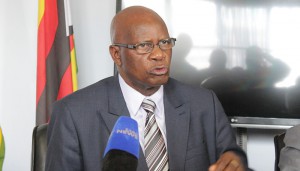Source: EDITORIAL COMMENT: The Perestroika budget | The Financial Gazette December 7, 2017

Finance Minister Patrick Chinamasa.
“SEISMIC shift” is a phrase that has been used liberally to describe the unseating of Robert Mugabe, Zimbabwe’s leader for 37 years.
That Mugabe has straddled our politics for four decades and looked invincible just three weeks ago adds some justification to the tectonic terms used to describe his exit.
But, in stark terms, nothing much has shifted so far. President Emmerson Mnangagwa, a decades-long close ally of the former president, has succeeded his mentor and proceeded to pick a Cabinet team largely made up of Mugabe appointees.
Today, however, Mnangagwa gets an opportunity to show the nation, and the world, if there is any substance to the appearance of change witnessed over the past fortnight. Today, Zimbabwe sees its first National Budget under a government presided over by someone other than Mugabe.
For too long, National Budget presentations were painfully predictable, stale affairs. And today’s statement could yet continue that trend.
There is not much to work with. The country has worked with a $4 billion annual budget since 2009. There can be no reasonable expectation that this will change today.
What we do expect are bold policy changes.
With 90 cents of every tax revenue dollar going towards paying salaries, government needs to institute bold measures to free up the budget and fund capital projects.
The widening budget deficit, expected to exceed 11 percent of gross domestic product this year, and uncontrolled borrowings, call for urgent fiscal consolidation.
Because tax increases could never be a consideration for Finance Minister Patrick Chinamasa, this makes deep spending cuts inevitable.
A good place to start would be State enterprises, which drain hundreds of millions annually from the fiscus. Parastatal reforms, which successive Mugabe governments only paid lip service to, need to be implemented immediately.
Within the broader strategic goal of seeking Zimbabwe’s re-integration into the international community, the country needs to revive its arrears clearance plan as agreed to in Lima, Peru, just over two years ago.
This is vital for several reasons, chief among which is to open up opportunities for fresh funding for Zimbabwe’s capital-starved economy. Clearing our arrears will also lower our country risk premium, a factor in the cost of lending to Zimbabwe and, consequently, businesses in the country.
The country’s investment laws would also need to be amended in tandem with the re-engagement effort in order to send, in the clearest possible terms, the message that Zimbabwe is open for business again.
All this means today’s budget should be a reform budget, to usher in a new era of reform and restructuring. Our Perestroika.
History has thrust it on Mnangagwa, and his trusted lieutenant Chinamasa, to make huge calls on Zimbabwe’s economic future. Having squandered countless opportunities over the past two decades in which government, under Mugabe, tried to turn economic orthodoxy on its head, Zimbabwe cannot afford any more missed chances.
Like Gorbachev, a communist apparatchik-turned-reformer who embraced reform (Perestroika) and ultimately dismantled communism, Mnangagwa has a golden opportunity of drawing Zimbabwe back from the precipice.
COMMENTS